My education at Notre Dame focused significantly on the ancient and medieval world. More than fifty of my 132 credits were on languages, cultures and ideas prior to the modern era, and these classes shaped the way I viewed my own life. I suspect the ways in which I lived and spoke were countercultural, not necessarily deliberately, but because many of my intellectual categories and contexts for thinking about life predated those of the contemporary world by millennia.
There’s a way in which such a life can be helpful, because a long view of history can explain, and at times, dissolve modern tensions. For a time, the influence of my education eased such paradoxes as gay and Catholic, pro-life and pro-woman, single and not lonely. And Notre Dame, as an odd Catholic organization-university-country club provided a space for relationships and activities that further lightened the paradoxes of modern life.
But at some point you have to face reality. We don’t live in the ancient or medieval world. We have seen, as Pope Frances has recently pointed out, the undoing of “the social structures which, for a long time, shaped cultural identity and their sense of the meaning of life and community.”
If the world has seen a MacIntyrean dissolution of the social structures which provide the context for pre-modern life and meaning, at a certain point moral artifacts of the pre-modern world seem to make less sense. Romeo and Juliet turn out to just be a couple of teenagers who were not very well adjusted and probably suffered from some sort of manic disorder. Catherine of Sienna was just bipolar. Aelred of Rievaulx was just a proto-homosexual repressed by a heteronormative patriarchy.
Pope Francis suggests a displacement of a holistic view of the world with a “consumerist vision,” and this new vision extends to both the material world and the human person. In a way, one could wonder whether such a vision towards persons could be avoided. Modern travel, atomized apartment living and the easy dissolubility of non-familial relationships can make people just as disposable as a plastic cup.
Further, the primary — perhaps only — modern social institution for resisting the disposability of human persons, marriage, is increasingly available only to wealthy educated couples, even if those couples can now be same-sex elites. Jonathan Rauch of the Marriage Opportunity Council recently noted a “growing danger that marriage … will look like a gated community for the baccalaureate class, with ever-shrinking working-class participation.” At one time, American churches could also provide resistance to the consumerist atomization of the human person. But as decreasingly social institutions, in the sense of providing a center for social life, churches largely lack the ability to provide cultural contexts which give meaning to their historic teachings.
Those who cannot or will not get married should be concerned by the fact that Americans are largely out of touch with their trash. A styrofoam cup goes to one of the nearly two-thousand landfills in the United States where it meets the rest of our forgotten and abandoned waste. This is simply what we do with our material belongings after they cease to be useful or take up too much space. The worrisome possibility is Pope Benedict XVI’s suggestion that “the book of nature is one and indivisible” and that “the deterioration of nature is closely connected to the culture which shapes human existence.”
A consumer culture means that when we shop, we’re shopping for our own garbage. This shopping applies both to material goods and to human persons. Perhaps this is why one of my philosophy professors once proclaimed in class that Taylor Swift is the voice of erotic love for my generation.
Taylor Swift speaks for the perpetually in love and the perpetually heartbroken. Indeed, her music suggests that to be in love is to already be heartbroken. There’s something about love that is fatalistic, in that you seek it even though you know deep down that it always ultimately fails and that it always ultimately crushes you. “I can see the end as it begins.” All that we can ask our former consumers, our former loves, after we find ourselves in the landfill is: “Say you’ll remember me.”
It might be an honor to have Taylor Swift write about you, but to know she will isn’t just to know that she loves you. It’s to know that one day, if it hasn’t happened already, one of you will be apologizing to the other who’s trying to not hear you. That’s just what love does in the landfill of modern life. And unfortunately, that’s the life we’re stuck in. Could we even imagine it any other way? What would it mean for us to live in a world where Taylor Swift didn’t make sense?
Love in the landfill
The views expressed in this column are those of the author and not necessarily those of The Observer.









